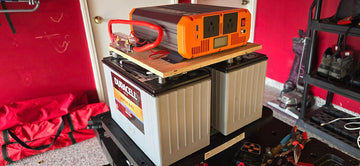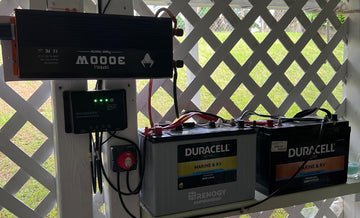In modern marine activities, a reliable supply of electrical power is essential for the safety and proper operation of a vessel. Whether used for navigation systems, fish finders, or other electronic equipment, the selection and management of marine batteries has a direct impact on the smoothness of navigation. This article explores the different types of marine batteries, in particular the advantages of lithium batteries, the technical parameters, and how to interpret battery voltage charts to help boat owners better understand and manage their boat's electrical system.
Types of Marine Batteries
There are three main types of marine batteries: lead-acid, lithium and nickel-metal hydride.
- Lead-acid batteries: These traditional batteries are widely used in boats and are relatively inexpensive, but are heavier and have a shorter lifespan. They are typically used for engine starting and basic power needs.
- Lithium batteries: Lithium batteries are becoming a popular choice due to their high energy density and lightweight design. They offer longer charge cycles and faster charging speeds.
- Nickel Metal Hydride (Ni-MH) batteries: These batteries are used in small boats and some specific applications, but are not commonly found in larger vessels.
Advantages of marine lithium batteries
Marine lithium batteries have many significant advantages over other types of marine batteries, and these advantages make lithium batteries more and more widely used in the marine field. The following is a detailed description of the advantages of marine lithium batteries:
Lightweight design
The positive and negative material density of marine lithium batteries is low, which makes their overall weight relatively light. Compared with traditional lead-acid batteries, lithium batteries can significantly reduce the deadweight of the ship under the same capacity, thus improving the ship's load capacity and speed. The lightweight design also helps to reduce energy consumption and carbon dioxide emissions, which is in line with the green and low-carbon requirements of the modern shipping industry.
High Energy Density
Lithium batteries have high specific energy, which means that they can store more power under the same weight or volume. Therefore, marine lithium batteries can provide longer sailing time and stronger power support under the same battery capacity. This is especially important for ships that need to sail for long periods of time, which can significantly reduce the charging time of ships in harbours or on the water and improve operational efficiency.
Good safety
Marine lithium batteries have good stability and explosion-proof, and can maintain stable performance in the harsh marine environment. The electrolyte of lithium battery is organic salt electrolyte, and there is no unsafe factor caused by hydrolysis and precipitation of hydrogen and oxygen. At the same time, the lithium battery has a long cycle life, reducing maintenance costs and replacement frequency, further improving its safety.
Fast charging speed
The charging speed of marine lithium batteries is relatively fast, and can be completed in a short time. This is very important for ships that require frequent use, which can significantly reduce the downtime of the ship and improve operational efficiency. In addition, lithium batteries can also support fast charging technology, further reducing charging time.
Environmental protection and energy saving
Marine lithium batteries as a power system are more environmentally friendly and energy-efficient, and do not produce exhaust gas and waste water. Compared with certain traditional battery technologies, lithium batteries do not contain toxic heavy metals and have less impact on the environment. This helps reduce environmental pollution and meets the green development needs of modern navies and shipping.
Layout Flexibility
Marine lithium batteries can store energy in multiple single batteries through the form of battery packs. This layout allows the ship to use the battery pack according to the actual operational needs, to ensure the flexibility of navigation and enough energy. At the same time, the relatively small size of lithium batteries helps to save valuable ship space and improve space utilisation.
Technical parameters of marine lithium batteries that need attention
The following technical parameters should be considered when choosing a suitable marine lithium battery:
- Voltage range: Find out the rated voltage of the battery and its charging and discharging range.
- Capacity: Measure the Ampere-hour (Ah) value of the battery to determine the running time of the equipment it can support.
- Charge Cycle: Focus on the battery's charge time and charger compatibility.
- Deep Discharge Capability: Find out how the battery performs at different depths of discharge to avoid damage from deep discharge.
Standard Marine Battery Voltage
The voltage of a standard marine battery is usually either 12V or 24V, depending on the specific needs of the vessel's electrical system. Below is a detailed breakdown of these two voltages:
12V Marine Battery
- Idle state: In a 12V electrical system, a battery in good condition should maintain a voltage of approximately 12.7 V when idle. if the battery voltage is slightly below this value, it does not necessarily indicate a problem with the battery. However, if the voltage of the battery is still lower than 12.3V after a period of idle time, it may mean that the battery has some kind of problem and needs to be checked and maintained.
- Charging process: During the charging process, the voltage of the battery will change. At the beginning of the charging process, the voltage of the battery may rise rapidly to well over 14 V. As the battery is gradually fully charged, its voltage will gradually fall to slightly above 13 V. If the battery is fully charged but continues to be charged, the battery will enter trickle charging mode, whereby a small amount of current will continue to charge the battery in order to keep the battery close to the full state of charge without causing any damage to the battery.
24V Marine Battery
- Float Charge Voltage: For series connected 24V battery packs, the charging voltage for float charging is generally adjusted between 26.4V~26.8V. Float charging is the battery pack long-term and charger output and loads connected in parallel online, as a backup power supply can be used at any time at the same time.
- Equalisation charging voltage: the equalisation charging voltage of series connected 24V battery pack is generally about 28.2V. Equalisation charging (also called strong charging) refers to the activation charging of the battery to avoid the deterioration of the terminal voltage imbalance tendency caused by individual differences in the battery, temperature differences and other reasons.
Voltage charts of marine lithium batteries under different states of charge
12V Marine Battery Voltage Chart
| Status | Voltage range (V) | Charge percentage (%) | Description |
| Start of Charge | 10.5V - 12.0V | 0% - 20% | The battery is charging and must be connected to the charger as soon as possible. |
| Fast charging | 12.0V - 13.5V | 20% - 80% | The battery is in the fast charging stage of the charging process. |
| Charging complete | 13.5V - 14.6V | 80% - 100% | The battery is about to be fully charged and charging should stop at this value. |
| Fully Charged | 12.6V - 13.2V | 100% | The battery is fully charged and ready for normal use. |
| Normal Discharge | 12.0V - 12.6V | 20% - 80% | Battery is discharging in normal operation. |
| Low Battery Warning | 11.5V | 10% - 20% | Battery is low and must be charged as soon as possible. |
| Discharge Cutoff Voltage | 10.5V | 0% - 10% | Discontinue use and charge to protect the battery. |
24V Marine Battery Voltage Chart
| Status | Voltage range (V) | Charging percentage (%) |
| Start of Charge | 20.0V - 21.5V | 0% - 20% |
| Rapid Charge | 21.5V - 23.0V | 20% - 80% |
| Charging complete | 23.0V - 28.8V | 80% - 100% |
| Fully Charged | 25.2V - 27.0V | 100% |
| Normal Discharge | 23.0V - 25.2V | 20% - 80% |
| Low Battery Warning | 21.0V | 10% - 20% |
| Discharge Cut-off Voltage | 20.0V | 0% - 10% |
Percentage of state of charge: The relationship between voltage and remaining charge is not linear but depends on the characteristics of the battery, but can be roughly judged by the voltage range.
Precautions in charging and discharging
- Monitor Voltage: Use a monitor to track battery voltage in real time to ensure operation within safe limits.
- Temperature control: In extreme temperatures, the performance of lithium batteries may deteriorate, monitor the temperature to ensure proper operation.
- Regular Maintenance: Charge and discharge cycles are performed on the battery regularly to keep the battery in optimal condition.
By understanding and using the above voltage charts, you can better manage the state of charge of your lithium batteries to ensure maximum safety and performance.
The relationship between voltage and marine battery performance
There is a close relationship between voltage and marine battery performance, which is reflected in a number of performance indicators of the battery, including energy output, charging efficiency, cycle life and safety. The following is a detailed analysis of the relationship between voltage and marine battery performance:
Voltage and Energy Output
Voltage is an important indicator of the energy output capability of a battery. In marine batteries, the level of voltage directly affects the current and power that the battery can provide. Generally speaking, the higher the voltage of the battery, the more current and power it can provide under the same conditions, so as to meet the demand for high energy output of the ship. For example, when starting a genset or driving large equipment, a high voltage battery is required to provide sufficient current and power.
Voltage and Charging Efficiency
Voltage also affects the charging efficiency of a battery. During the charging process, the battery needs to accept electrical energy from an external power source and convert it into chemical energy to be stored inside the battery. If the charging voltage is too high or too low, the charging efficiency will be reduced. Too high a charging voltage may lead to excessive heat inside the battery, or even trigger battery damage; while too low a charging voltage may prevent the battery from being fully charged, affecting the performance of the battery. Therefore, during the charging process, the charging voltage needs to be strictly controlled to ensure that the battery can be efficiently and safely charged.
Voltage and cycle life
The cycle life of a battery refers to the number of times a battery can maintain a certain performance during the charging and discharging process. The stability of voltage has an important impact on the cycle life of the battery. If the battery voltage fluctuates too much during the charging and discharging process, it will lead to stress inside the battery, accelerating the aging and damage of the battery. Therefore, maintaining voltage stability is critical to extending the cycle life of the battery.
Voltage and Safety
Voltage is also closely related to battery safety. If the battery voltage increases or decreases abnormally during the charging and discharging process, it may cause safety problems such as short circuit, overheating or even explosion. Especially in the special environment of ships, the safety of the battery is especially important. Therefore, when designing and using marine batteries, it is necessary to fully consider the impact of voltage on the safety of the battery and take corresponding safety measures to ensure the safe operation of the battery.
Consideration in practical application
In practical application, it is necessary to select the appropriate voltage range according to the specific needs of the ship and the performance characteristics of the battery. For example, for small ships or ships that need to sail for a long time, high voltage batteries can be selected to provide sufficient energy output and range; while for large ships or ships that need to start and stop frequently, batteries with stable voltage output and good charging efficiency need to be selected to ensure the normal operation of the ship.
How to avoid abnormal voltage of marine lithium battery
In order to avoid abnormal voltage of marine lithium batteries, the following measures can be taken:
- Use a suitable charger: Make sure the output voltage and current of the charger match the specification of the battery to avoid abnormal voltage caused by using an unsuitable charger.
- Regular inspection of the battery: Regularly inspect and maintain the battery, including checking the voltage, internal resistance, temperature and other parameters of the battery, so as to find and deal with the abnormal situation in time.
- Reasonable control of the charging and discharging process: During the charging and discharging process, reasonably control the charging and discharging currents and voltages, and avoid improper operations such as over-charging, over-discharging and instantaneous high-current charging and discharging.
- Installation of Battery Management System (BMS): BMS can monitor and manage the voltage, current, temperature and other parameters of the battery in real time to ensure that the battery operates within the safe working range.
Best 12V Lithium Battery for Boat Recommended
12V 100AH LiFePO4 Lithium Battery for Trolling Motors, Solar System, Marine, RV, Boat

The significant advantage of this lithium battery product is its excellent performance and long life. Compared with conventional lead-acid batteries, it has a service life of 8 to 10 times longer, with a cycle count of 2,000 to 5,000, as well as a higher energy density, a 30 per cent reduction in weight and a doubling of capacity. In addition, lithium batteries have no memory effect and hold their charge better when idle, without losing capacity due to previous discharge states. The built-in Battery Management System (BMS) provides multiple protections, including protection against overcharging, over-discharging, over-current, and short-circuit, as well as high-temperature and low-temperature cut-offs, to ensure that the batteries can operate safely under various conditions.
In addition, the flexibility and wide range of applications of this lithium battery product are also important advantages. The batteries can be used in parallel and series to expand capacity and voltage to meet a variety of needs. Whether for home energy storage systems, uninterruptible power supply backups, electric vehicles and portable devices, this battery is up to the task. Its wide range of applications and easy maintenance make it ideal for both indoor and outdoor applications.
FAQs
What is the charging voltage range of marine lithium batteries?
The charging voltage of marine lithium batteries usually depends on the type and specification of the battery, generally between 12V and 48V. The specific value needs to be determined according to the actual condition of the battery, you can refer to the battery manual or consult a professional. The correct charging voltage is the key factor to ensure stable performance and safe operation of the battery.
What is the limitation of discharge voltage for marine lithium batteries?
The discharge voltage of marine lithium batteries needs to be controlled within a certain range to ensure the normal use of the battery and extend the battery life. Generally speaking, the discharge voltage of LiFePO4 battery should not be lower than a certain threshold of its rated voltage (e.g. the terminal voltage of LiFePO4 battery should not exceed 2.0V at the lowest). Too low a discharge voltage may lead to stress inside the battery, accelerating battery aging and damage.
How to deal with the overcharging situation of marine lithium batteries?
The use of a charger that prevents overcharging and a battery equipped with a Battery Management System (BMS) can effectively monitor and limit the charging voltage to avoid overcharging situations.
Can marine lithium batteries be used in extreme temperatures?
The performance of lithium batteries may be affected under extreme temperatures, and should be avoided under extremely low or high temperatures.
What is the service life of marine lithium batteries?
Lithium batteries usually last between 2000 and 5000 charge cycles, depending on usage and maintenance.













